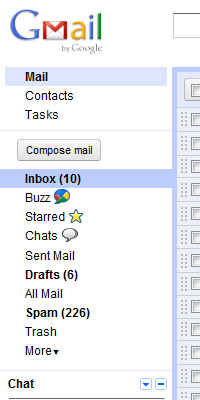Google updates Gmail service – adds visual, interface and accessibility tweaks

Gmail is one of the most widely used emailing services of today. Just a few days ago, Google had announced a multiple user sign-in feature for GMail and other services. So when the developers at Google decide to make small changes relating to its interface and contacts, it affects millions of Gmail users around the globe.

Even though the basic screen looks almost the same as it used to, Google hasn’t put in any new options – the engineers and designers have made minor tweaks here and there. The most noticeable change being the much used left-hand column now features Mail, Contacts and Tasks in a seperate pane of their own at the top. Compose mail, the only distinct link among the others is now a button, which has been moved down. The header size has been decreased, giving more space for the message part (about 16 pixels). Another change is the selection of messages (All, None, Read, etc) has been moved to a drop-down. The overall colour-scheme has also been revamped, giving it more of a web-app like polish.
Managing the new contacts list is like managing e-mails which involves adding, editing, deleting contacts which you can sort and group. In fact you can control how many contacts are displayed per page, along with your emails-per-page setting. You can also sort them by last name now, add custom fields (like ‘team’ if you’re managing a sports league newsletter) and break down name fields into first, middle and last. Merging has been made easier via the ‘more actions’ panel, and all changes are now saved automatically rather than requiring you to enter an edit mode. Thankfully, there’s an undo option as well, in case you manage to delete all 729 contacts in one fell swoop.
Here are some new features mentioned below which have been listed on the Gmail Blog:
- Keyboard shortcuts (go to Contacts and hit “?” for the full list)
- Sort by last name (look under “More actions”)
- Custom labels for phone numbers and other fields
- The ability to undo changes you’ve just made
- Auto-saving the changes in contact management
- Structured name fields, so you can adjust titles, suffixes, and other name components
- A bigger, more prominent notes field
- Flexibility to set number of contacts per page
